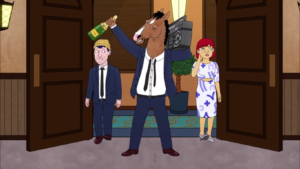Jason Bourne has just enjoyed its opening weekend at the top of the US box office charts and has had the strongest opening weekend for any film in the Bourne series in the UK. The film sees the return of The Bourne Supremacy and The Bourne Ultimatum director, Paul Greengrass and, most importantly to fans of the franchise, the return of Matt Damon as Jason Bourne. Both men have previously stated that they would only return to the franchise if the script was good enough and if the other man was also willing to return with them. This initial promise from these men is what makes Jason Bourne, despite its early financial success, so utterly disappointing. The film is solidly made and unsurprisingly well acted by its strong cast but is nothing more than a serviceable action movie and isn’t a shadow on the unique and gripping original trilogy. Put simply, the biggest problem with this film is how unnecessary every single aspect of it is. If Damon and Greengrass really only ever did plan to return to the franchise with something especially strong and compelling then one has to wonder what exactly they saw in this story to bring them back into the fold.
The film opens with Jason Bourne still in hiding a decade or so after his escape at the end of The Bourne Ultimatum. We soon learn that he has been keeping in contact with fellow fugitive Nicky Parsons (Julia Stiles) and is fighting in underground clubs to make money. This is the first in a series of questionable choices that the film makes with Bourne’s character. The Jason Bourne of the original trilogy was tough and lethal but was repentant for his violent past and would only fight people who were trying to kill him in order to secure his own survival. If Bourne is now so desperate for money and/or survival that he is willing to hurt others for money we need to be shown how he came to this point as it is a massive deviation from the character that we have previously known. This explanation, however, never comes throughout the film.
When Bourne and Nicky meet for the first time in the film Nicky reveals that she has hacked some CIA files that Bourne should read as they contain information about Bourne’s past that may help him to begin forgiving himself for his past actions. Bourne’s pursuit of this information becomes the film’s driving force and therefore the necessity of the film’s existence rests on whether this information is interesting or important enough to justify bringing Jason Bourne back into our lives. Sadly, the information does not live up to that need. In fact, not only is it not good enough to justify the existence of this film but, even worse, it actively alters our previous knowledge of who Jason Bourne is and why he signed up to Treadstone, and not in a good way. The big secret at the heart of this film (SPOILERS) is that Bourne signed up to Treadstone out of simple patriotism and as revenge for his father’s death who, it turns out, was also an agent (apparently, despite Bourne methodically piecing together his life over three previous films he was never able to remember that he grew up with a CIA agent as a father who was blown to pieces in front of him until now. Ok). The truly frustrating thing about this information is just how cliché and uninspired it is. The original Bourne trilogy was so loved because it put an original spin on a character who is essentially a fairly standard action hero. The reveal at the end of The Bourne Ultimatum that Jason chose to join Treadstone of his own free will and shot an unarmed, defenceless man to complete his training gave Jason Bourne a moral black mark that made him uniquely interesting amongst the heroes and anti heroes of action cinema. The man that we had followed and rooted for over the course of three films had always been a cold blooded killer who was not brainwashed or tricked or manipulated in the way we thought he had been. Jason Bourne made the choice to kill people for money without asking questions even if that person had an innocent family or was hooded and defenceless in front of him. To now turn that decision into Jason seeking revenge for his father’s death makes that decision less morally questionable in the least interesting way imaginable. A hero grappling with the knowledge that within himself is the ability and desire to kill indiscriminately without asking questions is infinitely more interesting than making that hero a run of the mill patriot avenging the death of his father.
This weak twisting and rearranging of Bourne’s history is the exact reason why this film should never have been made. What set Bourne apart from the James Bonds’ of the world was that Bourne had a very specific story that we could care about and empathise with. The more cliché and convoluted that story becomes, the harder it is to care about the character. The success of the Bourne series was precisely the reason why the Bond franchise took everything back to basics and made Bond a more human, gritty character and tried to get the viewers to invest in his relationships more than they previously had done (admittedly with significant success – M’s death in Skyfall elicited precisely the right reaction from the audience because of the genuine attempt to introduce some depth in the relationship between Judi Dench’s and Daniel Craig’s versions of M and Bond). Everything about the Bourne character becomes less specific and nuanced in this film. He makes more foolish decisions and has more naiveté than the methodical genius of the original trilogy because the character has to be made less intelligent in order for him to make the decision to come back into the spotlight under the weak terms that the film presents. As has been reported by many outlets, Bourne also has very few lines in this film, with around a third of his speech being in the trailers for the film. He spouts generic phrases or things that have essentially become Bourne catchphrases by this point (“I remember everything” and “I’m coming in” being the two most obvious examples of this). Similarly, the villain of the piece is a fairly generic super-evil director of the CIA who is given a fairly weak tie into Jason’s father’s death simply so that he and Jason have enough of a reason to keep chasing and trying to kill each other for the entire film. This is a waste of Matt Damon’s and Tommy Lee Jones’ massive talents, with both men doing their admirable best with underwritten roles.
As with every new release in a franchise there is always the hope that the film presents the right type of nostalgia for the audience to latch onto and enjoy. The new film in the series has to be original but it also has to present familiar themes and ideas in order for the fans to continue to love whatever it was that they enjoyed previously. The Bourne Ultimatum has a perfect example of this when Nicky cuts and dyes her hair in a scene purposely reminiscent of the first kiss between Jason and Marie in The Bourne Identity. The scene in Ultimatum highlights that Nicky is not Marie; Jason does not love her and will not passionately kiss her the way he did with Marie in a similar scenario. Jason Bourne has none of this clever nostalgia and instead goes for the easiest types of nostalgia. So, for instance when Nicky and Jason are being chased by a sniper as they try to escape on a motorbike it is painfully obvious that the scene will end with the sniper taking a shot at Jason and killing Nicky. Swap the motorbike for a car and Athens for India and you have the exact same scene as Marie’s death in The Bourne Supremacy. If this scene is meant to make us reminisce for Marie or make us pity how Jason can’t have anybody close to him without them dying, it fails. Instead it just feels like an unoriginal rehashing of the better chase scene in Supremacy and makes us pine for the time when this series could kill off a character that the audience, and Jason, was much more invested in.
The original Bourne trilogy was so unique and interesting that it is hard to turn down the chance at continuing the franchise when fans (myself included) would love to see Jason’s story continued in the right way (especially with the general dearth of action movies with legitimately interesting characters and storylines). However, if a good enough reason to continue Jason Bourne’s saga can’t be found then it becomes damaging to the legacy (no pun intended) of the original trilogy to continue regardless and one has to question Damon and Greengrass’ decision to do so in the absence of anything truly compelling within this film.



